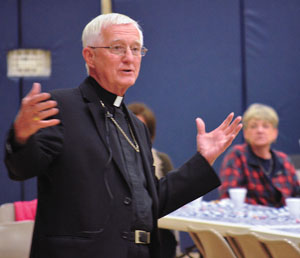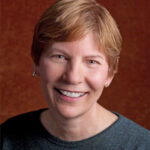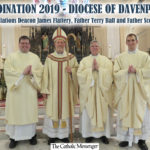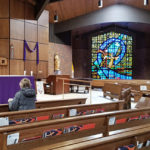By Barb Arland-Fye
The Catholic Messenger
Bishop Martin Amos returned from the annual fall meeting of his fellow bishops with greater insight about the challenges of responding as church in a complicated world.
“This particular meeting for me was very informational concerning national issues such as racism and international issues such as persecution of Christians in the Middle East. I realize how complex the world is and that there are no easy solutions, but many ramifications,” the bishop said in a Nov. 21 interview with The Catholic Messenger. He was among more than 200 bishops who participated in the Nov. 14-16 Fall General Assembly in Baltimore.
Issues that Bishop Amos made note of include:

• Doctor-assisted suicide. The bishops talked about a national campaign against assisted suicide. After the meeting, on Nov. 21, Cardinal Timothy Dolan of New York issued a statement calling for a renewed fight against doctor-assisted suicide. “Seven jurisdictions in the United States have now opened the legal doors to this dangerous abuse of medicine, an alarming trend that must be stopped for the sake of human dignity and the sacredness of life,” he said. “Catholics must join medical professionals, disability rights groups, and other concerned citizens in fighting for the authentic care of those facing terminal illness.”
• National convocation. “Convocation of Catholic Leaders: The Joy of the Gospel in America” will be held July 1-4 in Orlando, Fla. The convocation aims to form leaders and to equip and energize them to share the Gospel as missionary disciples and to offer fresh insights informed by new research, communications strategies and successful models. Pope Francis’ apostolic exhortation on the Joy of the Gospel will serve as a guide.
• Religious liberty. Four tasks were identified, Bishop Amos noted. “We’re called to pray for our people, to teach and preach the social teaching of the church, equip the laity in public action, and stand for ourselves when our ministry is challenged.”
• Promoting peace in the community. Prayer is the first component, and should be offered throughout the year, with a National Day of Prayer in September. Other recommendations: create a web page about racism, hold parish and diocesan conversations and training on the topic. Issues that impact racism include domestic violence, jobs/unemployment, education, prisons, gangs, gun laws and policing. Archbishop Wilton Gregory of Atlanta, Ga., called on his fellow bishops to issue a statement on racism. The topic will also be addressed at the 2017 convocation, Bishop Amos noted.
• Strategic Plan. The USCCB has developed a strategic plan for 2017-20 that identifies five strategic priorities: evangelization, marriage and family life, human life and dignity, vocations, and religious freedom. The strategic plan seeks to address needs within the lived experiences of today’s Catholics.
• Budget and Finance. Voting is still underway — by mail — concerning a revision of the formula for the diocesan assessment based solely on the offertory collection. A separate vote for a 3 percent increase in the diocesan assessment in 2018 was defeated.
• Extension of the Retirement Fund for Religious. The bishops extended the fund for 10 years. It was established in 1988 to address a lack of retirement funding for Catholic sisters, brothers and priests in religious orders. The National Religious Retirement Office coordinates the annual collection and distributes proceeds to religious communities in need. In 2016, the Congregation of the Humility of Mary in Davenport and Queen of Heaven Carmelite Monastery in Eldridge received financial assistance from the Retirement Fund for Religious.
• V National Encuentro of Hispanic/Latino Ministry. Scheduled for Sept. 20-23, 2018, V National Encuentro is described as “a process of evangelization, communion and consultation. It is intended to generate information for pastoral planning that responds more creatively to the Hispanic presence in the church and promotes ecclesial integration of all communities.” The process began with missionary activity and consultation and will include parish, diocesan and regional encuentros leading up to the national event.
• The church in Africa. The church in Africa has grown by 238 percent since 1985 and is approaching 200 million members, according to a report the bishops received. But African leadership is relatively young and challenged to lead a growing church while maintaining structures and programs built and funded previously by missionary orders. That funding and expertise is gone in many places. The bishops agreed to establish a permanent Subcommittee on the Church in Africa and approved the addition of two staff positions to the Office of National Collections in service to the subcommittee. The positions will be fully funded by the voluntary Solidarity Fund for the Church in Africa.
• Cultural diversity. A study on cultural diversity by the Center for Applied Research in the Apostolate (CARA) shed light on the growing diversity in the Catholic Church. Results of the report were shared with the bishops at the fall meeting. They were asked to examine the data and to consider it in planning, prioritizing and allocating resources in their dioceses.
(Read additional details about the bishops’ fall meeting on Page 6 of The Catholic Messenger.)











